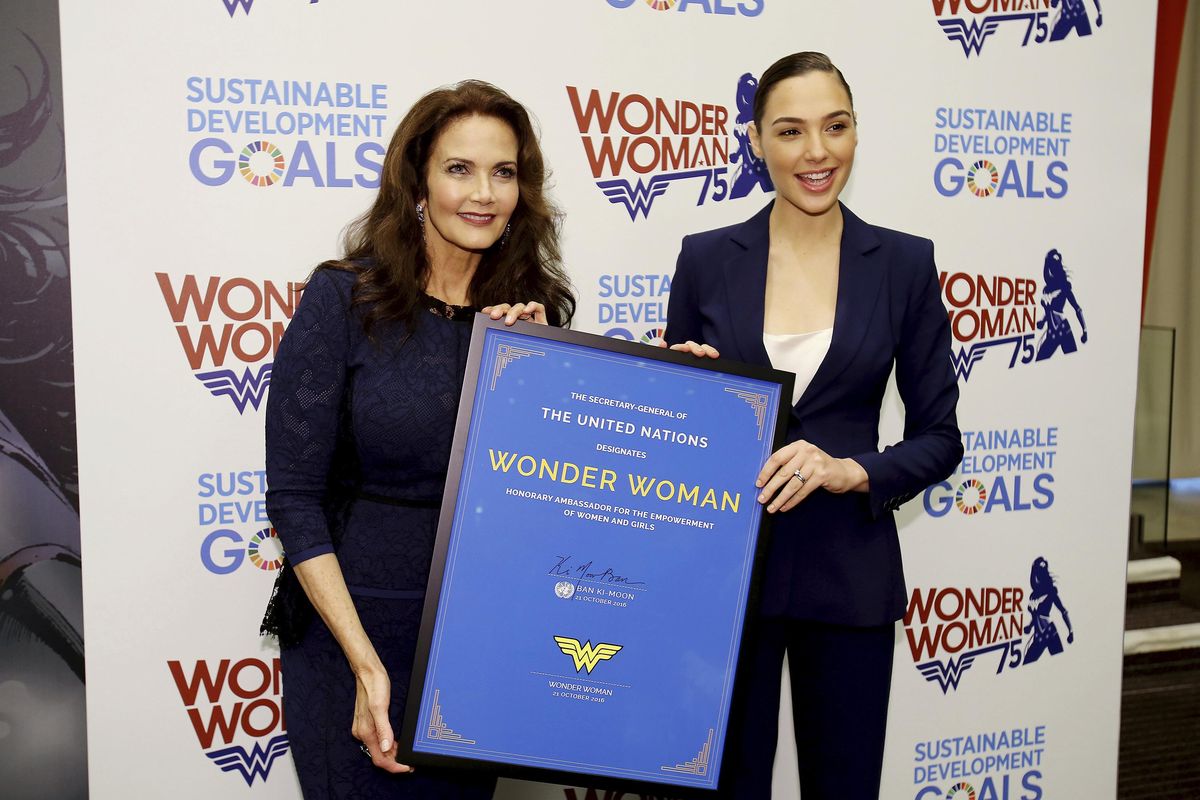Wonder Woman named honorary UN ambassador; not everyone is happy about it.

From her origin to her sexual orientation right down to her latest toned-down outfit, arguably no figure in all of superhero comics is more saddled with political scrutiny great and small than Wonder Woman. She projects strength with compassion; onto her, the world has projected so much else.
So it’s entirely in character that as Wonder Woman turns 75 this year, and as the United Nations on Friday named her Honorary Ambassador for the Empowerment of Women and Girls, the latest campaign to present the Amazonian princess as a symbol of self-empowerment is itself fraught with politics, as many oppose the U.N. designation.
Honorary ambassadors – as opposed to goodwill ambassadors – are fictional characters. The U.N. previously tapped Winnie the Pooh to be an honorary Ambassador of Friendship in 1998 and Tinker Bell as the honorary Ambassador of Green in 2009.
DC Entertainment and Wonder Woman brought out their big guns to publicize the new post for this “goddess of war” at the U.N. Gal Gadot and Lynda Carter were at the event. Gadot is the soldier/model/actress who was featured as Wonder Woman/Diana Prince this year in “Batman v. Superman: Dawn of Justice” (the character’s feature-film debut) – and who will star in the first Wonder Woman solo feature film in June. Carter played Wonder Woman on the ’70s TV show, a role so iconic that it has yet to be eclipsed in the popular public imagination.
There is a fitting cultural synergy here. This week, Carter will return to network TV to play the American president on the CW’s “Supergirl.” And Friday, DC and the WB were promoting the new campaign with the hashtag #WithWonderWoman – a sentiment that feels milled from the same cloth as Hillary Clinton’s stump slogan “I’m With Her.”
Friday’s ceremony also kicked off a 12-month campaign in which DC and Warner Bros., in teaming with the United Nations and UNICEF, are supporting “gender equality and women’s empowerment.” Yet not everyone at the U.N. itself views Wonder Woman as an appropriate symbol for such a campaign.
The character’s ambassadorship has sparked an online petition backed by hundreds of U.N. staff members, who urge Secretary-General Ban Ki-moon to reconsider the appointment of what they see as an underdressed, anti-feminist figure.
Somehow, this is all in keeping with Wonder Woman’s ever-roiling history within culture.
She was co-created by the psychologist/inventor William Moulton Marston, shortly after the World War II-era debuts of Superman and Batman, in direct reaction to those characters. Marston wanted a feminist character who could match DC’s first two superstars physically, yet also possess such traits as deep empathy in which, he felt, women were rendered superior.
And yet, within her feminist roots, Wonder Woman was forever depicted in bondage – a narrative staple that seemed to serve a dual purpose: Depict her fight for freedom as equivalent to the unshackling of a suffragette, yet also sexualize her fight for male readers.
Thus, Wonder Woman’s never-ending struggles as political figure were born. She was the superhero who could make the cover of Ms. magazine, yet still draw fire for her attire. It even made news last month when Wonder Woman writer Greg Rucka confirmed that Diana Prince was “queer” – a fact long ago presumed by readers of the heroine from the all-female Paradise Island.
On Friday, protesters attended the #WithWonderWoman U.N. ceremony. The Associated Press reported that some 50 U.N. staffers turned their back to the stage, some with their fists in the air, during the ceremony. Also, an online petition started by U.N. staffers asked the secretary-general to reconsider the appointment. As of Friday afternoon, it had more than 1,000 signatures.
Then again, it wouldn’t be a true Wonder Woman event without impassioned politics enveloping her like a golden lasso.